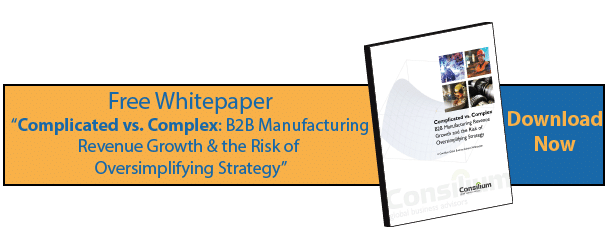Is 'profiling' a dirty word?
In our modern lexicon 'profiling' caries a number of emotionally charged connotations. It's probably safer to avoid using it in business conversation to avoid distracting from the topic at hand. Nevertheless I recently touched on the use of marketing automation and 'progressive profiling' as a tool to become better acquainted with prospects that lurk in your website shadows.
That's a process driven mostly by your motivation to gather insight to allow you to serve content which is ideally suited to their situation. It's a core functionality of marketing automation. Almost every company should do so as a simple tactic in a market development strategy...yet few do.
But that's the simple, amateur version.
What if you understood prospects even better than they understand themselves?
As you observe prospect behaviors in detail, and catalog each digital interaction, you'll gradually build a body of data which you can mine for incredible insight.
For example, what if you discovered a pattern in which a junior engineer downloads a whitepaper on a manufacturing challenge you understand well; and then if:
- within 3 days they download a document that explains how your product solves the challenge
- the same day they download a guide on how to justify such a purchase internally
- within two weeks the CFO downloads a justification whitepaper and calculator
- and purchasing views a matrix for how yours compares to competitors'
and you find that you sell 87% of the deals which follow that pattern, but discover that when the CFO doesn't get the whitepaper your success rate plunges to 19%...you now know exactly when, where, who and how you can manage your pipeline....
Or, what if you find that on projects where at least 4 different people at the company, visit at least 10 different pages each on your site, and all watch ABC video, your close rate is 20% higher - now you'd know which opportunities to prioritize for your reps.
And for a final example, if you found that on projects for which a prospect HR contact visited your site, your sell cycle was 40% faster. You'd know that it was important to create some tools/content to help your common "awareness" stage persona to proactively engage their HR colleagues in the process. The interviews and market research you conduct to create those tools would also form the basis for sales enablement training to help your reps successfully support a step which they would likely have otherwise skipped.
What's that worth? (What's your average deal size, lifetime value, and how would more efficient sales reduce your SG&A?) What patterns have you speculated about anecdotally that you could validate and build on digitally? And how many more could you identify with the wealth of digital behavioral data? What would that mean to your market development strategy?
Your hidden assets
We all tend to think of the stuff we make, and the structure we've created to make & sell it, as the business. What if that's superficial? What if you could create IP and business assets which transcended your specific product? How could you leverage that?
For instance, in the examples above, you've developed incredible insight into your prospect buyer behaviors. that allows you to:
- grow revenue more efficiently than industry averages and competitors
- project revenue precisely from your leads & pipeline
and if because of that capability you could:
- access capital more easily and cheaply than competitors
- provide a tempting strategic acquisition target because your sales process and proprietary market intelligence is industry leading
what would that mean to your company? business model? you personally?
A pattern based market development strategy could be a core competency
As long as your sales reps are banging the phones making cold calls, chasing 'contact us' web leads and following cold trails from old trade show leads this is all fantasy.
But if you're willing to take a deliberate, cerebral approach to developing your understanding of buyers, how companies really buy your product/service, and how your product really drives value for their business, then there's no reason why 18-24 months from now you couldn't be creating leads and predicting quarterly revenue with precision based on analysis of patterns like this.
It would take a LOT of work. Probably more than you could manage internally, and certainly would require expertise which you likely don't have in house. But those are minor hurdles compared to the opportunity to redefine your market development strategy, and possibly your enterprise valuation, simultaneously.
Want to get there? A first stop is to understand the complexity of today's markets. Download our free whitepaper for a deep dive into what complexity theory teaches us about B2B sales growth.

